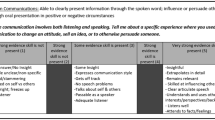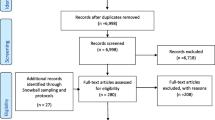Abstract
Purpose
Teamworking and clinical decision-making are important in multidisciplinary cancer teams (MDTs). Our objective is to assess the quality of information presentation and MDT members’ contribution to decision-making via expert observation and self-report, aiming to cross-validate the two methods and assess the insight of MDT members into their own team performance.
Materials and Methods
Behaviors were scored using (i) a validated observational tool employing Likert scales with objective anchors, and (ii) a 29-question online self-report tool. Data were collected from observation of 164 cases in five MDTs, and 47 surveys from MDT members (response rate 70%). Presentation of information (case history, radiological, pathological, comorbidities, psychosocial, and patients’ views) and quality of contribution to decision-making of MDT members (surgeons, oncologists, radiologists, pathologists, nurses, and MDT coordinators) were analyzed via descriptive statistics and the Jonckheere–Terpstra test. Correlation between observational and self-report assessments was assessed with Spearman’s correlations.
Results
Quality of information presentation: Case histories and radiology information rated highest; patients’ views and comorbidities/psychosocial issues rated lowest (observed: Z = 14.80, P ≤ 0.001; self-report: Z = 3.70, P < 0.001). Contribution to decision-making: Surgeons and oncologists rated highest, nurses and MDT coordinators rated lowest, and others in between (observed: Z = 20.00, P ≤ 0.001; self-report: Z = 8.10, P < 0.001). Correlations between observational and self-report assessments: Median Spearman’s rho = 0.74 (range = 0.66–0.91; P < 0.05).
Conclusions
The quality of teamworking and clinical decision-making in MDTs can reliably be assessed using observational and self-report metrics. MDT members have good insight into their own team performance. Such robust assessment methods could provide the basis of a toolkit for MDT team evaluation and improvement.



Similar content being viewed by others
References
American College of Surgeons. Commission on cancer. Cancer program standards. Chicago: American College of Surgeons; 2004, revised 2009. Available from: http://facs.org/cancer/coc/programstandards.html. Last Accessed 01 March 2011
The Department of Health. Manual for cancer services. London: The Department of Health; 2004.
McAvoy B. Optimising cancer care in Australia. Melbourne: National Cancer Control Initiative. Aust Fam Physician. 2003; 32(5):369–72.
Wright FC, Lookhong N, Urbach D, Davis D, McLeod RS, Gagliardi AR. Multidisciplinary cancer conferences: identifying opportunities to promote implementation. Ann Surg Oncol. 2009; 16(10):2731–7.
NHS National Cancer Action Team. Multidisciplinary team members views about MDT working: Results from a survey commissioned by the National Cancer Action Team. London: NHS National Cancer Action Team; 2009.
Taylor C, Munro AJ, Glynne-Jones R, Griffith C, Trevatt P, Richards M, et al. Multidisciplinary team working in cancer: what is the evidence? BMJ. 2010;340:c951. doi: 10.1136/bmj.c951.
Hong NJ, Wright FC, Gagliardi AR, Paszat LF. Examining the potential relationship between multidisciplinary cancer care and patient survival: an international literature review. J Surg Oncol. 2010;102(2):125–34. Review.
Lamb BW, Brown KF, Nagpal K, Vincent C, Green JSA, Sevdalis N. Quality of care management decisions by multidisciplinary cancer teams: a systematic review. Ann Surg Oncol. doi:10.1245/s10434-011-1675-6 [Online March 26, 2011].
Forrest LM, McMillan DC, McArdle CS, Dunlop DJ. An evaluation of the impact of a multidisciplinary team, in a single centre, on treatment and survival in patients with inoperable non-small-cell lung cancer. Br J Cancer. 2005;93(9):977–8.
Newman E, Guest A, Helvie M, et al. Changes in surgical management resulting from case review at a breast cancer multidisciplinary tumor board. Cancer. 2006; 107(10):2343–2351.
Haward R, Amir Z, Borrill C, et al. Breast cancer teams: the impact of constitution, new cancer workload, and methods of operation on their effectiveness. Br J Cancer. 2003; 89(1):15–22.
Look Hong NJ, Gagliardi AR, Bronskill SE, Paszat LF, Wright FC. Multidisciplinary cancer conferences: exploring obstacles and facilitators to their implementation. J Oncol Pract. 2010; 6(2):61–8.
Lamb B, Wong H, Vincent C, et al. Teamwork and team performance in urological multidisciplinary cancer teams: development and evaluation of an observational assessment tool. BMJ Qual Saf. 2011. doi:10.1136/bmjqs.2010.048660.
Chang JH, Vines E, Bertsch H, et al. The impact of a multidisciplinary breast cancer center on recommendations for patient management: the University of Pennsylvania experience. Cancer. 2001; 91(7):1231–7.
Pawlik TM, Laheru D, Hruban RH, et al. Evaluating the impact of a single-day multidisciplinary clinic on the management of pancreatic cancer. Ann Surg Oncol. 2008; 15(8):2081–8.
Bumm R, Feith M, Lordick F, et al. Impact of multidisciplinary tumor boards on diagnosis and treatment of esophageal cancer. Acta Chirurgica Austriaca. 207; 39(3):136–40.
Blazeby JM, Wilson L, Metcalfe C, et al. Analysis of clinical decision-making in multidisciplinary cancer teams. Ann Oncol. 2006; 17(3):457–60.
Leo F, Venissac N, Poudenx M, et al. Multidisciplinary management of lung cancer: how to test its efficacy? J Thorac Oncol. 2007; 2(1):69–72.
Wood JJ, Metcalfe C, Paes A, et al. An evaluation of treatment decisions at a colorectal cancer multi-disciplinary team. Colorectal Dis. 2008;10(8):769–72.
Kidger J, Murdoch J, Donovan JL, et al. Clinical decision-making in a multidisciplinary gynaecological cancer team: a qualitative study. BJOG. 2009; 116(4):511–7.
Lanceley A, Savage J, Menon U, et al. Influences on multidisciplinary team decisionmaking. Int J Gynecol Cancer. 2008; 18(2):215–22.
Lamb BW, Green JSA, Vincent C, et al. (2010) Decision-making in surgical oncology. Surg Oncol. doi:10.1016/j.suronc.2010.07.007. Online 3 March 2011.
Calland JF, Guerlain S, Adams RB, et al. A systems approach to surgical safety. Surg Endosc. 2002; 16(6):1005–14.
Vincent C, Moorthy K, Sarker SK, et al. Systems approaches to surgical quality and safety: from concept to measurement. Ann Surg. 2004; 239(4):475–82.
Arora S, Tierney T, Sevdalis N, et al. The Imperial Stress Assessment Tool (ISAT): a feasible, reliable and valid approach to measuring stress in the operating room. World J Surg. 2010; 34(8):1756–63.
Fletcher G, Flin R, McGeorge P, et al. Rating non-technical skills: Developing a behavioural marker system for use in anaesthesia. Cogn Technol Work. 2010; (6):165–71.
Undre S, Sevdalis N, Vincent C. Observing and assessing surgical teams: the observational teamwork assessment for surgery© (OTAS)©. In: Flin R, Mitchell L, editors. Safer surgery: analysing behaviour in the operating theatre, 1st edn. (2009). Derbyshire: Ashgate.
Undre S, Sevdalis N, Healey AN, et al. Observational teamwork assessment for surgery (OTAS): refinement and application in urological surgery. World J Surg. 2007; 31(7):1373–81.
Lamb B, Payne H, Vincent C, et al. The role of oncologists in multidisciplinary cancer teams in the UK: an untapped resource for team leadership. J Eval Clin Prac. doi: 10.1111/j.1365-2753.2010.01507.x [Online March 3, 2011].
Jamtvedt G, Young JM, Kristoffersen DT, et al. Audit and feedback: effects on professional practice and health care outcomes. Cochrane Database Syst Rev. 2003; (3):CD000259.
Undre S, Koutantji M, Sevdalis N, et al. Multidisciplinary crisis simulations: the way forward for training surgical teams. World J Surg. 2007; 31(9):1843–53.
Abell N, Springer DW, Kamata A. Developing and validating rapid assessment instruments. New York: Oxford University Press; 2009.
Jonckheere AR. A test of significance for the relation between m rankings and k ranked categories. Br J Stat Psych. 1954; 7: 93–100.
Amir Z, Scully J, Borrill C. The professional role of breast cancer nurses in multidisciplinary breast cancer care teams. Eur J Oncol Nurs. 2004; 8(4):306–14.
Junnola T, Eriksson E, Salantera S, et al. Nurses’ decision-making in collecting information for the assessment of patients’ nursing problems. J Clin Nurs. 2002; 11(2):186–96.
Stalfors J, Lundberg C, Westin T. Quality assessment of a multidisciplinary tumour meeting for patients with head and neck cancer. Acta Otolaryngol (Stockh). 2007; 127(1):82–87.
Lutterbach J, Pagenstecher A, Spreer J, et al. The brain tumor board: lessons to be learned from an interdisciplinary conference. Onkologie. 2005; 28(1):22–6.
Elwyn G, Laitner S, Coulter A, et al. Implementing shared decision making in the NHS. BMJ. 2010; 341:c5146.
Healey A, Undre S, Vincent C. Developing observational measures of performance in surgical teams. Qual Saf Health Care. 2004;13(Suppl 1):i33–i40.
Yule S, Flin R, Paterson-Brown S, et al. Non-technical skills for surgeons in the operating room: a review of the literature. Surgery. 2006; 139(2):140–9.
Künzle B, Kolbe M, Grote G. Ensuring patient safety through effective leadership behaviour: A literature review. Safety Sci. 2010; 48(1):1–17.
Acknowledgment
We are grateful to the Pelican Cancer Foundation (UK) and Action for Bladder Cancer (UK) for facilitating the research reported here. This work was supported by the National Institute for Health Research through the Imperial Centre for Patient Safety and Service Quality and Whipps Cross University Hospital NHS Trust R&D Department. The funding source played no role in study design, collection, analysis or interpretation of data, in the writing of the report or the decision to submit the paper for publication. The corresponding author had full access to all data in the study and had final responsibility for the decision to submit for publication.
Conflict of interest
The authors report no conflicts of interest.
Author information
Authors and Affiliations
Corresponding author
Rights and permissions
About this article
Cite this article
Lamb, B.W., Sevdalis, N., Mostafid, H. et al. Quality Improvement in Multidisciplinary Cancer Teams: An Investigation of Teamwork and Clinical Decision-Making and Cross-Validation of Assessments. Ann Surg Oncol 18, 3535–3543 (2011). https://doi.org/10.1245/s10434-011-1773-5
Received:
Published:
Issue Date:
DOI: https://doi.org/10.1245/s10434-011-1773-5




